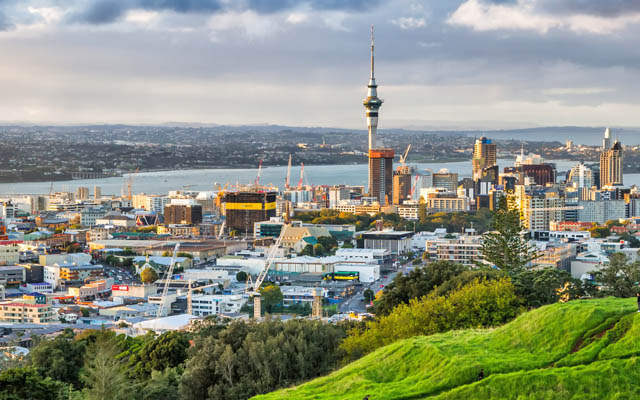
Tourism New Zealand (TNZ) is focused on increasing visitor numbers during off-peak periods to support sustainable and productive growth in the tourism sector as it recovers well from lockdown.
Tourist visitation is returning to its traditional pattern of peaking in the summer months, and unless measures are taken, peak visitor numbers are likely to increase more rapidly than off-peak periods. Seasonal peaks and troughs make it difficult for the tourism sector to operate productively throughout the year.
 Tourism New Zealand aims to promote New Zealand as a year-round destination. Pictured is Auckland, New Zealand.
Tourism New Zealand aims to promote New Zealand as a year-round destination. Pictured is Auckland, New Zealand.
TNZ chief executive René de Monchy commented since the launch of the new four-year strategy for 2024-2028 that the tourism sector is now the country’s second largest export.
“We aim to increase international tourism by NZ$5 billion (US$3.05 billion) over the next four years, with 70 per cent of that coming from visitors in the off-peak travel season,” he said.
TNZ is targeting an 8.7% increase in international tourism spending (worth an additional NZ$900 million) for FY25, and a 9.6% increase in off-peak international tourism spending (worth an additional NZ$655 million).
“FY25 is the first year of our four-year strategy and this year we are looking to increase visitor numbers during off-peak periods whilst also focusing on building a longer-term visitor pipeline,” de Monchy said.
In the first year of the new strategy, TNZ will focus on three areas: increasing New Zealand’s attractiveness as a year-round destination, growing off-peak visitor numbers, supporting sector sustainability and enhancing the visitor experience.
“TNZ will support the government’s export growth objectives and alleviate the industry’s seasonal visitor challenges by increasing off-peak visitor numbers alongside efforts to support peak visitor numbers,” Mr de Moncey said.
Dave Beach, CEO of Real NZ, which offers peak summer experiences such as cruises in Fiordland and the TSS Earnslaw and Walter Peak in Queenstown, as well as winter holiday ski fields at Cardrona and Treble Cone, shared how travel companies have adapted their operations to fit in with the traditional off-season.
“This allows us to retain more staff, utilize our facilities more effectively and enhance the guest experience, which is why we are very much in favor of spreading the tourism burden across seasons,” Beach said.
Meanwhile, New Zealand International Convention Centre (NZICC) general manager Prue Daly said: “We believe the business events sector has a key role to play in this effort. Business event attendees prefer to travel at less busy times to avoid crowded destinations, which enhances the experience and supports seasonality.”
“TNZ’s vision is perfectly aligned with NZICC’s work as the majority of the international conferences and business events we facilitate are scheduled during low tourist periods.”

